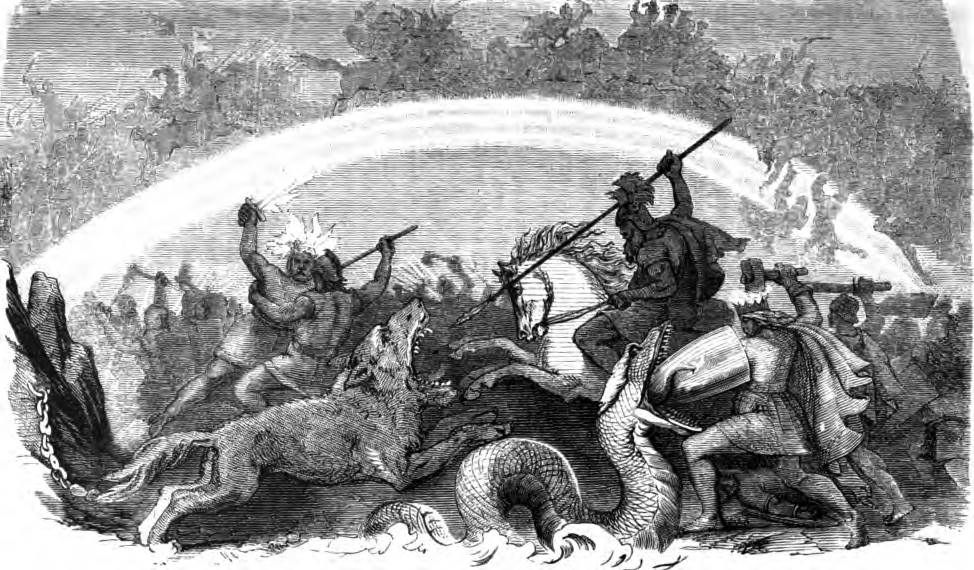Known for one of the most refined epistolary novels, the Booker Prize winning Possession (1990), which will rip your heart out and make it pump tears of saddest sad sadness, one can only imagine the Wagnerian angst & pathos such a talent could lend to the verses of the Gods. Yet the tender Possession and the Icelandic skald Snorri Sturluson's mythopoeic collection are also worlds away from each other, and the gap shows at times.
 |
| [Friedrich Wilhelm Heine's "Kampf der untergehenden Götter" (1882).] |
Byatt also a offers a psychological take on the monstrous wolves who chase the sun & moon across the sky as "wolves of the mind", an ever-present built-in idea of the intellect's potential for self-destruction manifest as the ravening creatures that threaten to swallow the sources of illumination in ourselves & the world. Plus she posits that if the wolves weren't there as the clockwork that drives day into night and night into day, there would be no demarcations of time or season without them, and no universal/internal motivators to keep ourselves achieving instead of descending into darkness or lassitude.
Framing all this re-appropriation of the lore is Byatt herself presented as "the thin, pale child", a nameless girl displaced into the countryside by the Blitzkrieg of World War II (much like a Pevensie of Narnia), with naught much else but a copy of a Norse mythology book to give her some strange & fantastic comfort. The child's voice is hardly that of a child, but of our 75-year-old authoress looking back at herself, and at the Heathen legends that fascinated her far more than the compulsory trips to monotheistic church or a secular schoolhouse.
Outside the lines, Ragnarok succeeds as a commentary of amazement with a wonderfilled personal embellishment, an ambitious filling out of the cosmology. Most inventive is Randrasill, the undersea skeletal analogue to Yggdrasil, her construct equally full of life, giving the reader a deepwater survey of the aquatic legion that surrounds Midgard. Exiled into this world by Odin, Byatt also performs another first by presenting a POV from world serpent Jormungandr, and adding scenes of Loki's fathership in raising his daughter from simple sea snake into an ominous ouroboros.
Less than these two inventions, Byatt lends her explanations to the Baldur story. One always questions that if Baldur's death means the worlds' end, why would the gods make a game of throwing potentially deadly things at him? Yet once the gods come up with it, "Hit the Baldur" isn't just an afternoon novelty but the best-game-ever invented, and they find they can't stop from playing. One also questions why if Frigga went through the trouble of ranging the whole of the Nine Worlds to obtain a promise from everything animate & inanimate, how did mistletoe get neglected? We find that mistletoe appeared in the world just after this infinite contract was closed, that it was still childlike and "too young to make a promise", leaving its innocence open for Loki's manipulation into a weapon.
When Ragnarok does unfold, another in-battle perspective Byatt presents is that Thor doesn't realize he's been poisoned until it's too late, turning to brag to the Aesir that he bested his nemesis and lived, only to fall to the venom on his ninth & very last step.
 |
| [Marvel Thor is not amused.] |
Conclusions? Ultimately there's no payoff with the Nazi threat, or the conflict inherent in her Germanic heritage, or a ratification of a Heathen worldview, so the framework for the storytelling's inconclusive as it never comes back around to the pale child who is Byatt in any satisfying way. There could've been a sort of Teutons versus Angles call-forward, an examination of the "wolves" that drive the conflict of war, like natio/tribal fascism, and comment on the necessity of preparation for war, but none of these ideas are ever truly exercised.
Byatt uses parts of Ragnarok as an allegory on our inability to save the world, to change our story, and in her afterword goes so far as to place her interpretation's concern for the world as an ecological one, which is a thoroughly modern use. The disconnect here's evident: Byatt's contemporary purpose is not the timeless purpose of the lore. Not to say that the Norse creation/apocalypse doesn't contain everything (oh it surely does), but the tenuousness of physical existence more reflects man's barely sustainable grasp in a world of forces that defies his daily living with an unrelenting ice & harsh frost that deny him resources and its impact on him, as opposed to his impact on it. If one can bypass this mis-inversion, there's alot of other grand exploration to be had in Byatt's otherwise earnest rendition the Norse lore. Like in Possession, there's a strong lifelong and even more cosmic love here that cannot be denied.
# # #
While a
mostly happy bookstore fixture for over two decades, Guillermo Maytorena
IV is currently willing to entertain your serious proposals for
employment as a literary/cinema critic, goth journalist, castellan,
airship pilot/crewperson, investigative mythologist, or assisting in a
craft brewery. Should you be connected to any of the above or equally
interesting endeavours, do contact him.

No comments:
Post a Comment